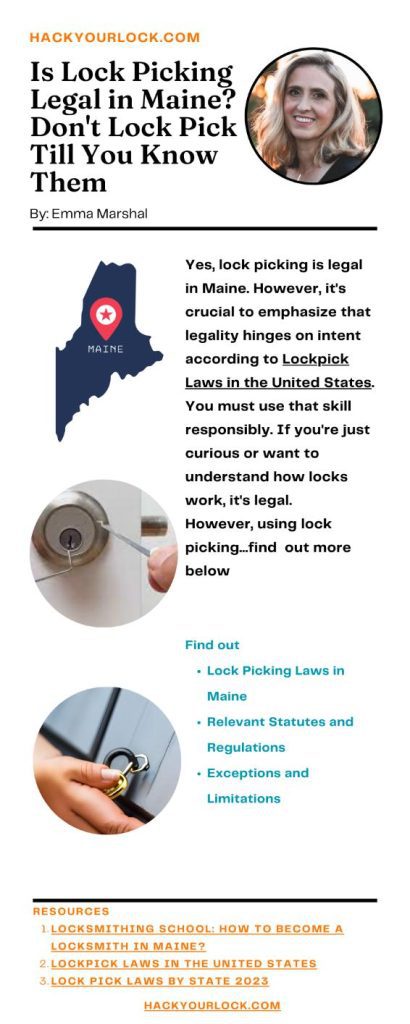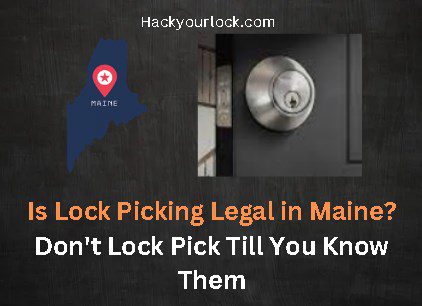In the world of locksmithing and security, the art of lock picking often finds itself at the center of intriguing discussions.
For beginners dipping their toes into the realm of locks and keys, one of the first questions that may arise is, “Is lock picking legal in Maine?”
This inquiry isn’t just about satisfying curiosity; it touches on the legal aspects surrounding a skill that has both practical and recreational applications.

In this article, we will explore the mysteries surrounding the legality of lock picking in the picturesque state of Maine.
Contents
Is Lock Picking Legal in Maine?

Yes, lock picking is legal in Maine. However, it’s crucial to emphasize that legality hinges on intent according to Lockpick Laws in the United States.
You must use that skill responsibly. If you’re just curious or want to understand how locks work, it’s legal.
However, using lock picking for illegal activities, like breaking into places without permission, is definitely not allowed.
So, while the learning part is okay, always remember to use your lock picking skills for the right reasons and stay within the legal boundaries.
Lock Picking Laws in Maine

Lock picking laws in Maine revolve around the question, “Is lock picking legal in Maine?” Lock picking laws in Maine are governed by specific statutes designed to regulate the possession and use of lock-picking tools.
Relevant Statutes and Regulations
Here is the information about relevant statutes and regulations regarding lock picking laws in Maine presented in a table format:
| Statute/Regulation | Description |
| Maine Revised Statutes Title 17-A § 405 | Defines criminal burglary, incorporating entering structures with the intent to commit a crime. |
| Maine Revised Statutes Title 17-A § 953 | Prohibits possession of burglary tools with the intent to use them for unlawful purposes. |
| Maine Revised Statutes Title 17-A § 402 | Outlines criminal trespass, covering unauthorized entry into premises with varying degrees of severity. |
| Maine Revised Statutes Title 17-A § 101 et seq. | Describes general principles of criminal liability, encompassing actions with criminal intent. |
Is lock picking legal in Maine should become more clear from conditions of legality and illegality.
Conditions under Which Lock Picking is Considered Legal or Illegal in Maine
| Conditions | Legal Status |
| Lock Picking for Educational Purposes | Generally Legal, when used for educational purposes and skill development. |
| Professional Locksmiths | Legal, when performed by licensed and authorized locksmiths for legitimate purposes. |
| Consent or Authorization | Legal, when performed with the explicit consent of the property owner or authorized personnel. |
| Emergency Situations | Legal, when used by emergency personnel to gain access in situations that require immediate attention. |
| Criminal Intent | Illegal, when lock picking is done with the intent to commit a crime, such as burglary or unauthorized entry. |
There is a comprehensive article on Is lock picking illegal in the US for detailed information on all states in this regard.
Following table summarizes the key points from Maine Revised Statutes § 17-A-403, in Lockpick Laws In the United States.
| Statute Section | Description |
| Maine Revised Statutes Title 17-A § 403 | Defines the offense of possession or transfer of burglar’s tools. It is illegal for a person to possess or create tools, instruments, or articles commonly used for unlawful entry or breaking into safes, with the intent to use them for criminal purposes. It’s also illegal to transfer or possess with the intent to transfer such tools knowing they are designed for criminal use. |
Exceptions and Limitations
In Maine, lock picking is legally permitted for licensed locksmiths, law enforcement personnel, and individuals with explicit property owner consent.
Licensing Requirements of Locksmiths in Maine
Embarking on the journey to become a locksmith in Maine doesn’t follow a strict set of rules, but certain keys open doors according to Locksmithing School: How to Become a Locksmith in Maine?
To become a locksmith in Maine, individuals must meet basic eligibility criteria, including being 18 years or older, possessing good moral standing, and having key skills in mechanics and mathematics.
While no formal education degree is required, obtaining locksmith training or working as an apprentice is recommended.
Certification from recognized entities, though optional, enhances qualifications. There is no specific licensing requirement in Maine as of August 2022.
Entrepreneurs can start their locksmith business, either with a physical shop or as a mobile locksmith. Joining a trade association is advised for industry updates and support. Continuous learning is crucial in this evolving field.
| Step | Details |
| Eligibility | Age 18+, sound mind, good moral background, key skills in mechanics and mathematics. |
| Education | No formal education required; locksmith training or apprenticeship recommended. |
| Certification | Optional but enhances qualifications; various courses available, such as CLL, CRL, CPL, CML. |
| Employment | Seek employment with local locksmith companies or work as an apprentice to gain hands-on experience. |
| Start Business | Obtain a state-issued business license; consider insurance; start your own locksmith business if entrepreneurial. |
| Licensing | No specific locksmith licensing in Maine as of August 2022; verify current legal requirements. |
| Trade Association | Join a reputable trade association for industry updates, networking, and support. |
| Continuous Learning | Stay updated with industry advancements; attend seminars and educational opportunities for ongoing development. |
Penalties for Illegal Lock Picking
It is crucial to inform aspiring lock pickers about the legal consequences associated with engaging in illegal lock picking activities within the state. Lock picking, when done with the intent to commit a crime or gain unauthorized access, is a serious offense that can lead to severe penalties.
Maine Revised Statutes Title 17-A § 403 outlines the possession or transfer of burglar’s tools, making it illegal for an individual to possess tools or implements designed for advancing crimes involving unlawful entry or breaking into safes, with the intent to use them for criminal purposes.
Penalties:
Criminal Charges
Individuals caught engaging in illegal lock picking may face criminal charges under relevant statutes, including charges related to burglary or possession of burglary tools.
Fines
Conviction for illegal lock picking can result in substantial fines, varying based on the severity of the offense.
Imprisonment
Offenders may be subject to imprisonment, with the duration of the sentence determined by the specific circumstances of the illegal lock picking activity.
Criminal Record
A conviction can lead to the establishment of a criminal record, impacting future employment opportunities and personal reputation.
Legal Counsel
If you are facing allegations related to illegal lock picking, it is imperative to seek legal counsel promptly. Consulting with an experienced attorney can provide guidance on navigating the legal process, building a defense, and potentially mitigating the consequences associated with such charges.
Do you want to know about similar aspects related to lock picking in other states as well? Other states like California, Arizona, Alaska, Alabama, Ohio, New York, Washington, Florida, Virginia, Colorado, Connecticut, Delaware , Georgia, Hawaii, Iowa, Idaho, Kansas, Kentucky, Louisiana, Massachusetts, Maryland etc. have also similar regulations.
Conclusion
In wrapping up our exploration into the legality of lock picking in Maine, it’s crucial for both students and budding lock pickers to grasp the nuances surrounding this skill. While lock picking itself is not inherently illegal, the key lies in the intent behind it.
Maine Revised Statutes Title 17-A § 403 emphasizes that possessing lock-picking tools with the intent to use them for unlawful entry or criminal activities is strictly prohibited. For those eager to delve into the world of lock picking, understanding and respecting these legal boundaries is paramount.
So, is lock picking legal in Maine? The answer is yes, with a caveat. It’s legal when approached responsibly, with a genuine interest in learning and understanding the mechanics of locks. However, the line is crossed when this skill is wielded with criminal intent.
For students and new lock pickers, the key takeaway is to pursue this craft ethically, avoiding any activities that may lead to legal repercussions. Always be mindful of the law, respect others’ property, and consider the potential consequences of your actions.
In the end, the legality of lock picking in Maine hinges on responsible practice and a commitment to ethical use. As you embark on your lock-picking journey, remember that knowledge should be paired with a strong sense of responsibility.
FAQ’s
- Is Lock Picking Legal in Maine?
Lock picking is legal in Maine as long as it is conducted responsibly and without criminal intent. Possessing the necessary tools with the intention of using them for unlawful entry is strictly prohibited, emphasizing the importance of ethical practice within the state’s legal framework.
- Can I Learn Lock Picking Online in Maine?
Absolutely! Lock picking can be learned online in Maine through reputable sources and courses. Consider exploring certified locksmith training programs to ensure you acquire the necessary skills while respecting the legal boundaries associated with lock picking in the state.
- Is Certification Required for Lock Picking in Maine?
While not mandatory, obtaining certification, such as CLL or CRL, can bolster your credibility and skills as a lock picker in Maine. Always check local regulations to ensure compliance, as different regions may have specific requirements or recommendations for those practicing lock picking within the state.
Resources
- Locksmithing School: How to Become a Locksmith in Maine?
- Lockpick Laws In the United States
- Lock Pick Laws by State 2023
